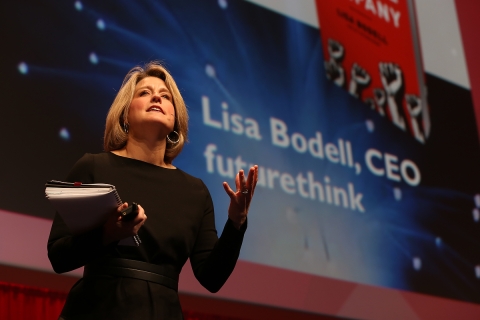PCMA's Convening Leaders Annual Meeting in Boston Draws Highest Attendance Ever

From Jan. 12-15, several thousand attendees flocked to the Professional Convention Management Association’s Convening Leaders 2014 annual meeting in Boston, making it the highest attended event in the organization’s history.
While PCMA President and CEO Deborah Sexton declined to reveal the actual number of attendees at a press conference held during the event, she did say that this year broke the two previous years’ records held by Orlando and San Diego, which both had 3,751 attendees.
Final attendance numbers will be released after the event, once all the registrations are tallied and no-shows are accounted for, she added.
“Boston should be very proud … and we are also,” Sexton said.
Besides the onsite attendees, there also were at least 600 registered for PCMA’s digital hybrid event, which featured 21 hours of streamed content, and Sexton added she thought the final number would be closer to 1,000.
The event kicked off at an opening reception at the Boston Convention & Exhibition Center, which featured three levels of entertainment and local food choices highlighting the city.
The following morning during the opening general session at the Hynes B. Convention Center, James E. Rooney, executive director of the Massachusetts Convention Center Authority, said, “We hope to create an event that entertains, enthralls and educates.”
Massachusetts Gov. Deval Patrick also took the stage and said, “We’re delighted you’re here. … We hope you come back with families, colleagues and lots and lots of conventioneers.”
The keynote for the opening was Lisa Boddell who heads futurethink and talked about how companies need to make sure they don’t become too complacent.
She added that people should take a look at what rules need to be broken in their organizations and encouraged the audience to not get too ‘comfortable’ relying on emails and meetings to get through the day.
The keynote had an impact on attendee Leslie Murray, director of meeting planning for NAFSA – Association of International Educators.
“I liked the opening general session speaker,” she said. “I’m going back and telling everyone in my department to kill two rules.”
Besides the bevy of sessions every day that ran concurrently and were spread throughout the Hynes and adjacent Sheraton Boston, there also was an expanded Learning Lounge 2.0 designed in collaboration with Freeman.
The Learning Lounge 2.0 had five different color-coded zones – Illumination, where keynote speakers could continue the conversation in a more intimate atmosphere; Playroom, where topics were presented and people could brainstorm in smaller groups; Innovation, where a hackathon was taking place to come up with a new mobile app for the event; Connections, where people could have a ‘meetup’ on like-minded topics; and Social, where live tweets, Facebook and other feeds were available about the event.
“The wonderful thing about PCMA is they really push the envelope and they like to innovate on behalf of their members,” said Alison Smith Jenks, senior vice president of FreemanXP. “It’s a very immersive experience.”
Many of the aspects of the Learning Lounge 2.0 could be translated at convention planners’ own events, she added.
Something new at this year’s annual meeting was TechCentral that also featured a Tech Bar at which people could get help on their devices or whatever technology issue they needed resolved at the time, as well as different-sized sessions with varied topics and an area featuring cutting-edge tools like a virtual screen that allowed attendees to step into an Arctic landscape alongside polar bears.


Add new comment